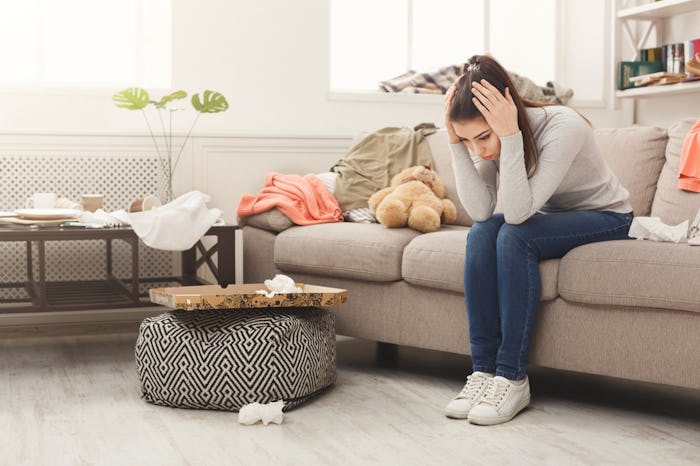Life

It's Not Just In Your Mind — Clutter Is Absolutely Affecting Your Health & Parenting
I hate clutter. It makes me uncomfortable, and it feels like it takes up as much space in my mind as it does my home. But my husband and children do not share the distaste for clutter that I have acquired, and therefore, there are times when my space is not how I would prefer. I admit, when my space gets cluttered, I feel as though there's a physical weight bearing down on my ability to function. It affects my daily life in ways I never anticipated, from productivity to parenting. How clutter affects parenting is unique from person to person, but there are common themes that most parents share.
I reached out to therapists and professional organizers to speak with them about how clutter affects parenting, and why it can be such an issue for people. Expert after expert told me the same thing: cluttered home, cluttered mind. The spaces you hold in your everyday life reflect your inner self, and it's highly cyclical. If your mind's a mess, you often make your spaces reflect that, and if your space is a mess, your mind begins to mirror those spaces. Knowing that this is often the problem can help prevent you from allowing the clutter to build up in the first place.
Merriam Saunders, LMFT, marriage and family therapist tells Romper that a lot of the ways in how clutter affects parenting are practical. "If a home is cluttered, it is likely difficult to find important things at the ready. Extra time may be needed to get out the door, causing you and your family frequently to be late," she says. "It's easy to lose things like permission slips, keys, soccer cleats when you need them." We've all been there. Someone has their book bag strewn across the living space, someone has their jacket hung across a chair instead of on its hook — it makes the daily grind much more difficult.
But that's not nearly all of it. "The impact of losing things, being late, being unable to quickly find what you need, and being visually stimulated can cause chronic stress," Saunders says. It's that aching feeling of being unable to accomplish what you want, when you want to get it done. It is a nagging sensation that is hard to ignore.
That chest-tightening feeling isn't just in your mind. Saunders says that it also affects your body, noting that "chronic stress is unhealthy for numerous reasons. It leads to a constant higher level of cortisol in the system, which has been shown to contribute to inflammatory diseases. It can cause a foggy-headed feeling, making concentration hard. All of this can mean a very irritable, exhausted, and disorganized parent at the end of the day."
It's not only the parents who are affected. It's also the children, which can have a negative rebound effect on them, according to Kimberly Williams clinical neuropsychologist and clinical psychologist of Long Island, New York. She says that if you are in a state of clutter and disorganization that it will likely continue with your children. "Cluttered spaces model this level of disorganization for your children. If children think a mess is the norm, they have no motivation to live their lives in a more organized manner and the cycle continues."
In short, you're teaching your children that this is what they can expect. That the scattered thoughts and stress are the normal course of life, and that maintaining that clutter is acceptable.
I get it, at some point, your home's going to be a hot mess — you're a parent, it comes with the territory. However, modeling to your children good behavior and allowing them to make those messes — but also to clean them up — not only teaches them a valuable lesson in life, but also makes parenting a heck of a lot easier in the long run.